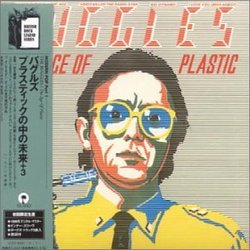| All Artists: Buggles Title: Age of Plastic Members Wishing: 2 Total Copies: 0 Label: Island/Universal Japan Release Date: 3/26/2002 Album Type: Import, Collector's Edition, Original recording reissued Genres: Alternative Rock, Pop, Rock Style: New Wave & Post-Punk Number of Discs: 1 SwapaCD Credits: 1 UPCs: 4988005289117, 731454627429, 0731454627429, 766489314129, 821838505921 |
Search - Buggles :: Age of Plastic
 | Buggles Age of Plastic Genres: Alternative Rock, Pop, Rock
Japanese reissue of 1980 album, packaged in a miniature LP sleeve. Includes the bonus tracks 'Island', 'Technopop' & 'Johnny On The Monorail (A Very Different Version)'. |
Larger Image |
CD DetailsSynopsis
Album Description Japanese reissue of 1980 album, packaged in a miniature LP sleeve. Includes the bonus tracks 'Island', 'Technopop' & 'Johnny On The Monorail (A Very Different Version)'. Similar CDs
|
CD ReviewsThe Buggles's critique of much more than video and radio Lawrance M. Bernabo | The Zenith City, Duluth, Minnesota | 07/28/2003 (5 out of 5 stars) "The Buggles have their place in music history because their quirky hit "Video Killed the Radio Star" has the distinction of being the first music video shown on MTV. But their 1980 debut album "Age of Plastic" deserves to be remembered on its own terms; not just for the "futuristic" music, but because the lyrics represent a coherent critique of the world of technology as being full of potential but fraught with peril. Even a cursory look at "Video Killed the Radio Star" shows the song is offering up less than subtle ironies about the medium of pop music, not to mention the fledgling MTV. The Buggles consisted of the tandem of Geoffrey Downes on percussion/keyboards and Trevor Horn doing bass/guitar/percussion/vocals, both of who were obviously more interested in producing. That same year they produced the Yes album "Drama," and the pair ended up joining the group and replacing Jon Anderson and Rick Wakeman. Pay attention to the lyrics on this album. "Kid Dynamo" is about the death of imagination in the age of mass media, a proposition that is clearly becoming more and more obvious with each year. "I Love You Miss Robot" is not kinky, despite its title, and is about the pitfalls of human dependence on technology. As for the music, it is pretty diverse. ""Video Killed the Radio Star" is upbeat and peppy while "Johnny on the Monorail" is the exact opposite, dark and brooding. Of course, at the time the use of electronic devices was considered cutting edge and the novelty of it all distracted from the potency of the lyrics. The Alan Parsons Project tried to do something along these lines with with 1977's "I Robot," but that effort seems ponderous and pretentious when compared to "Age of Plastic." I think I could make a compelling argument that this is one of the top ten, or at least top two dozen albums, from the decade (and you can go either way on that as the end of the 1970s or the start of the 1980s)." One-off soundtrack to the industrialized future Daniel J. Hamlow | Narita, Japan | 10/14/2002 (4 out of 5 stars) "How to describe the Buggles? How about this: staccato robotic and electronic sounds coupled with light-hearted sounds, soaring female choruses, electric guitars, new-wave synthesizers, and vocals and an overall proto-industrial sound that would influence Depeche Mode, Camouflage, New Order, and Electronic. The difference is that the Buggles sound less colder than the above groups. The title track is a prime example of what I described above."Video Killed The Radio Star," historical because its video was the one that launched MTV, is far better than the Presidents of the United States remake. The distance travelled between different media, from that wireless back in 1952 to the then-present day of 1979, can be heard in the distorted male vocals and the strings, which evoke a kind of nostalgia for the lost past. The female vocals singing the chorus are classic.Things move to a quicker pace with "Kid Dynamo," with electric guitars and strings boosting things along."I Love You (Miss Robot)" with electronically synthesized vocals singing the chorus lends credence to the futuristic setting of this album. Love those female vocals mid-song!"Clean, Clean" begins with a slow baroque synthesizer before going full force with guitar and drums. The synthesizer solo in the middle of the song is classic late 70's new wave electronica."Elstree" is a slower number about the British studio of the same name and tells of the protagonist's fantasy of playing heroes in historical B-pictures. The song closes with the sounds of a galloping horse. An electronical version of that stock music from British historical sagas is included as well."Astroboy" isn't as remarkable compared to the rest of the album. "Johnny On The Monorail" however, continues with the quick-paced soundscape of synthesizer-mania.This is more of a futuristic mechanized soundtrack for the industrial landscape of the current day and near future than ELO's Time. Considering that this came out in the new-wave movement of the late-70's/early 80's, this one-of-a-kind nugget is to be cherished for all time." Holds Up Well -- Much More Than You Think Todd and In Charge | Miami, FL | 09/16/2005 (4 out of 5 stars) "There is a lot going on in this album than the one-off novelty of "Video" suggests -- this is a complex sci-fi ode to a discomforting, sometimes optimistic, occasionally joyful future. It's rendered in an engaging, deft mix of "new-wave" synth sounds, sterile guitar and drums, and washes of sound that manage to capture the tone and feel of this near-future dystopia quite effectively.
To me, it's a bit like The Cars' Panorama or Todd Rundgren's The Ever Popular Tortured Artist Effect, both recorded at the same time, in that what is created here is an insular world, a bit cold and distant, providing a glimpse at the future that, to my ears today, ironically sounds quaint, inviting, and comforting. To be honest, as the headlines today blare continuing bad news, I'm going to keep going back to this future as it's often preferable to our present...." |

 Track Listings (8) - Disc #1
Track Listings (8) - Disc #1

